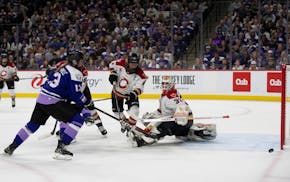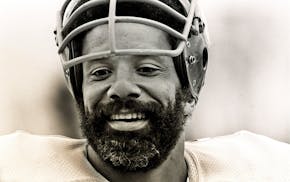When talking about grief, it is popular to talk about five stages — first outlined by Elisabeth Kübler-Ross in her 1969 book "On Death and Dying." Those stages, in order: denial, anger, bargaining, depression and acceptance.
While it's unclear if Wild fans are simply in different stages of grief following their team's swift five-game first-round playoff exit to the Blues, the explanations being offered for what went wrong fit pretty neatly into those five stages. Let's take a look:
Denial: This isn't showing up so much now since most rational people would not deny the series is over. But it did show up earlier in the series.
It seemed like the more obvious it became that Minnesota was probably doomed against the Blues as the hole became deeper and St. Louis kept coming up with most of the big plays, the more Wild fans tried to believe the series was still very much in hand.
Anger: Then again, some fans throughout the series — and particularly when it ended Saturday — went quickly to the "Wild choked/wilted under pressure" explanation. There's certainly something to this reaction, even if it is a pretty raw one.
Wild players seemed to be pressing at various points in the series, owing to a combination of elevated expectations from the regular season and the frustration of having so many glorious scoring chances denied by goalie Jake Allen.
Bargaining: Then again, the other extreme is to shrug and say, "Hockey is weird. What are you going to do?" That seemed to be the message from Wild coach Bruce Boudreau when he said of the Blues: "They weren't the better team. But they won four games." The Wild dominated several statistical categories — almost all of them except the scoreboard.
Bigger-picture, hockey is indeed strange. Home ice advantage has meant next to nothing in this year's playoffs. The Wild has never won a playoff series in which it had the home ice advantage (0-for-3) and has instead won four playoff series in its existence when it was the underdog. Hot goalies and fortunate bounces can dictate an entire series.
Depression: That said, more long-suffering fans aren't wrong when they confront a depressing possibility: Maybe the roster construction is flawed? After all, this is five consecutive years with playoff berths but exits either after the first round (three times) or second round (twice).
The core of those teams has largely been the same. Those who grouse about the team General Manager Chuck Fletcher has put together or implore him to swing for the fences in some high-risk, high-reward moves for more game-changing players certainly have a point.
Acceptance: Not everyone will get to this point, but if they do they might come to the conclusion that the Wild overachieved to a degree during the regular season. Teams that do that are ripe for playoff disappointment when they face strong teams every night.
But a five-game playoff exit shouldn't totally erase the fact that this was a good regular season — the best one, in fact, in Wild history.

Twins lose second in a row to Blue Jays as bullpen falters late

The PWHL's growth comes with a price for a Minnesota Frost team building a potential dynasty
What is the 'House settlement,' and what does it mean for the Gophers and NCAA?

Souhan: Anxiety and depression in the NFL helped inspire Lindsey Young's children's book
